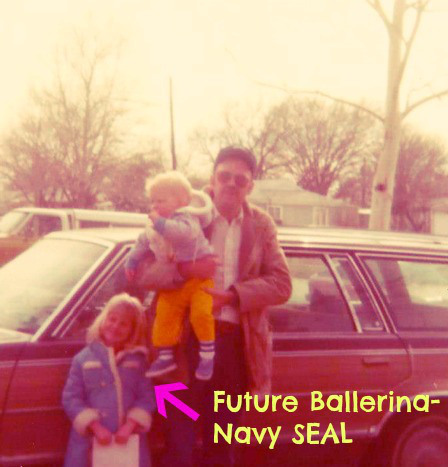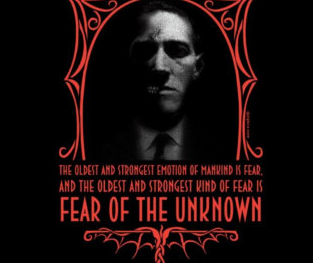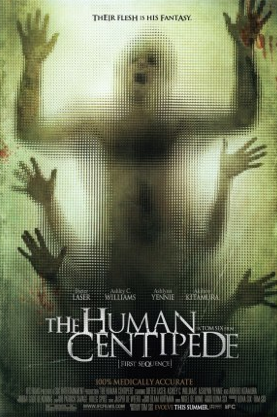Kristen Lamb's Blog, page 71
October 9, 2013
“Write What You Know”—Paying Attention to the Character Journey
Okay, yesterday I shared the tragic story of my father’s passing to give to an idea of what it means to “Write what you ‘know’” and today we’ll continue, but it’ll be a bit different. We’re going to talk about character change.
My dad was a HOOT. Both of us were always like kids. One time we both bought Christmas gifts for each other. Any year the anticipation would have KILLED us and we would have totally spilled the beans early, but this time we waited until Christmas morning to “unveil the PERFECT gift”—only to realize we both bought each other the same things; a Klingon dictionary and a tape to teach you how to speak Klingon.
My dad was always a little unconventional. Other little girls grew up wanting to be models or ballerinas. I wanted to grow up to be a ballerina-Navy SEAL. My father (former Navy Intelligence) used to tote me from ballet lessons to Karate (back in the days when girls were NOT in Karate), and I was one of the first girls to fight competitively (when it was ALL boys).
Dad taught me to shoot when I was eight and how to sharpen knives properly by the time I was ten. He bought me an SAS Survival guide for my birthday in high school. To train me to be better with my feet (a tad too much ballet and not enough power) he hung a canvas sea bag for me to practice.
I recall when I made a certain belt, I had to learn how to use a weapon and I chose the long staff since it was the most practical (and one of the few not illegal, LOL).
So Dad is in the yard training me for my test with the long-staff. He says, “Okay, on the count of three…” then whacks the holy $%#@%^&*&%$# out of my shins. As I am curled on the ground in pain, he hovers over me, grinning and says, “Fights in the real world don’t give you a count of three.”
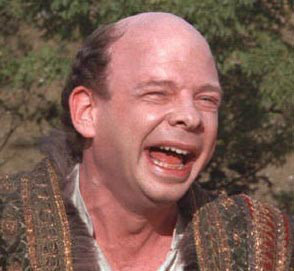
Ha ha ha ha ha ha.
In later years I went to a ritzy private college (was one of the few poor kids allowed in under the fence) and while other girls were in sororities, I was teaching Ju-Jitsu. In fact, I was one of the first instructors of Brazilian Ju-Jitsu, commonly known as Gracie Ground-Fighting. Doesn’t matter how big you are. Get a fight on the ground and know what you’re doing and the other dude is toast.
My Dad gave me an extreme sense of sticking up for others. I remember one day I was in between teaching classes and our dojo was located in front of a major traffic light. I’d taken off my belt to rest and stepped outside when I noticed this guy beating the holy hell out of his petite girlfriend in his truck. Without thinking (and barefoot) I go flying into the road and dare the guy to hit ME.
“Come on! You like hitting little girls? Hit me. I’ll even give you the first swing.” I probably would have dragged the guy out of his truck but the light turned green and the coward took off.

Image via Flikr Creative Commons, courtesy of Anamorphic Mike.
Since teaching Ju-Jitsu didn’t pay the best, I also worked selling newspaper subscriptions and often was out in apartment complexes after dark (gets dark early in winter). I had some drunk try to mug me for my briefcase, which made no sense because the only things in there were paperwork and my expensive retainer, which was useless for pawning.
*rolls eyes*
He came up behind me in an arm-bar choke hold, but what he didn’t know is there is a nerve in the forearm, that if you crank down on it? Is VERY painful and will make most people release. I then beat the bejeezus out of him with the very briefcase he was trying to steal.
And y’all thought I was so sweet and delicate  .
.
I mountain-biked before it was cool. I rock-climbed, went bouldering, jumped out of planes, and ran rapids. To my knowledge, I was the 46th person in the state of Texas to have a Concealed Handgun License. I only got one because I went camping almost every weekend. I lived life like a Mountain Dew commercial, largely because of my dad. I wonder to this day if he realized he had cancer and was trying to teach me to make the most of every moment.
But back to the bigger story…
I believe abusive people are often attracted to the strong to see if they can dominate them and break them. By the time of my father’s passing, my Evil Ex had changed me into a person I didn’t recognize. Through years of mental abuse, I no longer had an opinion or chose my own clothes. I didn’t visit family or friends because it wasn’t worth the verbal beating. I no longer camped or rode trails on my mountain bike because he “didn’t like outdoors stuff.”
I literally lived with the guy from Sleeping with the Enemy. He had labels in the pantry and all cans had to be facing forward and behind the “proper” label. He’d insist I vacuum all the floors then use a carpet rake to make all the lines go the same direction. He loved to play racquetball, namely so he could spend an hour laughing as he used me as target practice (then tell me I had no sense of humor, that he was just “playing”).
Never mind all the bruises.
Trust me when I say Evil-Ex was NOT this way before I accepted the marriage proposal. He was an ideal boyfriend and seemed he’d be an ideal husband. My family loved him (Dad hated him).
When it comes to abuse, it’s a lot like the story of the frog. Toss a frog in boiling water and it will jump out. Yet, set the sucker in cool water and turn up the heat slowly? The frog will boil to death without realizing it’s in danger.
So after Dad passed away, something of my former self ignited. Within a couple months, I began to ignore Evil-Ex’s antics. No insult worked. I wore what I wanted and grew my hair long. I even bought a gorgeous citrine ring (because Dad’s favorite color was yellow). When Evil-Ex had nasty comments about the ring, I replied, “You don’t have to like it. You aren’t wearing it.”
All along I was funneling money and plotting my escape and Evil-Ex began to notice the verbal assaults were being ignored. About a month before I left for good, he was yelling at me over something and must have noticed it was no longer having an impact.
He raised his hand to hit me and I replied in a low voice, “Go ahead. Hit me. But you better pray to God you knock me out long enough to start a new life somewhere else. I know a thousand ways to kill you and get away with it.”
I didn’t, but must have been very convincing.
I left and never looked back, but this “story of my life” reveals something about character arc. Yes, Kristen in the beginning was somewhat of a bad@$$, but obviously something was lacking. I grew up very poor, so when a wealthy man from high society showed interest, I ignored the warning signs. Deep down, I believed he was better than me…and that was the opening. I had to be tested by fire to grow into a person who believed in herself, who accepted she wasn’t “girlie” and that was okay.
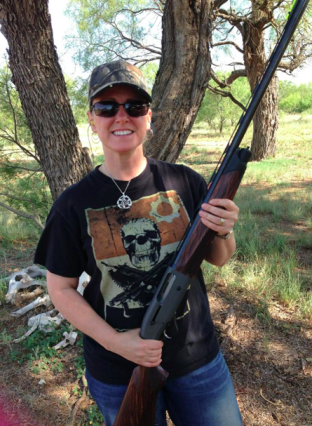
This is my BOOM-STICK!
I had to learn that money was meaningless. Yes, I lived in a big house and rode around in a Mercedes and took lavish trips, but I was miserable and hurting and NO MONEY, NO RITZY LIFE was worth the price. I had to become a person who was willing to live in poverty if it meant being happy. I had to learn what “security” really meant and I can tell you from experience it ain’t always a bank account.
Now, I can bemoan the experience, but it was VERY valuable. Not only did I grow as a person, but this time prepared me to become a writer. When Dad died, he never realized his dream. I had the same dream and was willing to do anything to fulfill it. There were many years I lived on Ramen and saltines and worried that the lights might get turned off. I wore clothes I rescued from Dumpsters. Nothing would stop me from becoming a writer.
So when you hear “Write what you know” harvest those emotions, but also pay attention to your personal journeys. What changed? What was missing initially that the “journey” provided. I am much the same person I was before Evil-Ex, but that critical flaw is now gone (probably replaced with New & IMPROVED ones, LOL).
What about your journey? Have you been through something difficult and when you look back, you SEE how you changed? And changed for the better? I want to hear YOUR stories!
I LOVE hearing from you!
To prove it and show my love, for the month of October, everyone who leaves a comment I will put your name in a hat. If you comment and link back to my blog on your blog, you get your name in the hat twice. What do you win? The unvarnished truth from yours truly. I will pick a winner once a month and it will be a critique of the first 20 pages of your novel, or your query letter, or your synopsis (5 pages or less).
Announcements: I LIED. I will announce September’s contest winner TOMORROW. Yes, Kristen IS human. Forgot today was Dad’s birthday and not altogether “there.” Sorry. Great ploy to get y’all back  .
.


October 8, 2013
“Write What You Know” and What That Means
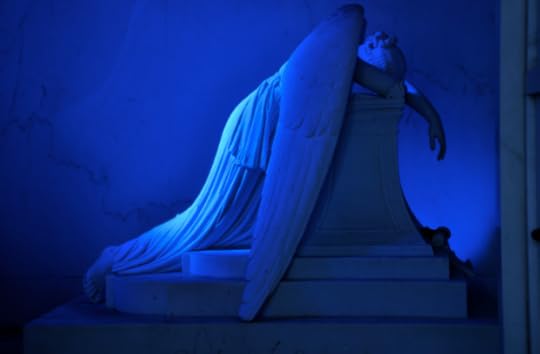
Image via Flikr Creative Commons, courtesy of Ben Swing.
We often hear the saying, “Write what you know,” and that advice can be seriously confusing. Since I’m assuming most of us have never been abducted by aliens, lived on other planets or turned into vampires, the story world would be a very boring place if we followed this advice literally.
Plot and world-building are merely delivery systems for conflict and character—real “human” emotions and experiences. If we write something that’s all car chases, vampire bites and geeky technology we’ve invented, the story will be uninteresting and superficial. I see this in a lot of submissions I review. A writer gets so fascinated with dragons or terrorists or aliens that the body of the work lacks a beating human heart.
Any good story should be able to change locations or points in history and still make sense. A Thousand Acres is King Lear on an Iowa farm. Fiction probes the deep and tender places, exposes our human failures and shows us how we can rise above them. If your story is set on the planet Zoltron, we should be able to take the premise and slap it in Sanger, Texas and it still work.
Thus, when we hear “Write what you know” this alludes to, “What do we know about ourselves? What do we know about others? What do we know about society? What do we know about emotions?”
A Personal Story
Some of you might have heard me talk about this, but it bears repeating. In 1999 I planned a surprise birthday for my father. He’d always longed to become a writer, but he since he worked for minimum wage repairing bicycles, he was relegated to scribbling poems and stories in stacks of little notebooks.
I was so excited because my fiancé had purchased my dad a “top of the line” computer with a Pentium processor (supposedly several thousand dollars, which he reminded me of repeatedly). It took EVERYTHING not to give Dad his gift early (I’m notorious for that) and to keep this gift a secret.
Finally, my father would have the tool to become a novelist.
My best friend and I had ordered Dad this silly A Bug’s Life cake because, like me, my father was a perpetual kid with a great sense of humor. He laughed all the time and was like hanging out with a standup comedian. She was busy decorating her home with A Bug’s Life plates and streamers as if the party were for a six-year-old (instead of someone turning 50). It was going to be SO MUCH FUN.

Image via Flikr Creative Commons, courtesy of Will Clayton
Yeah.
So I’d arranged to take him out to dinner as a ruse to spring this party on him. All day, I’d tried to reach him and no answer. I really became worried when I called his work and they told me he’d called in sick. All my life, my father NEVER called in sick. Finally, after calling and paging him a zillion times, I got a call.
He sounded terrible and his voice was strange—high and thin. Of course, he was still joking as I was playing remote-triage-nurse concerned that maybe his flu might be meningitis. As I am asking him symptoms, I’m panicking because this birthday party is waiting to go and it’s looking more and more like I need to get him to an ER instead.
As he spoke his last words to me, the phone dropped to the floor.
Nothing.
In my head, I thought He’s dead, which was weird because my father rode a bike to work. He rollerbladed, mountain-biked, hiked and was more physically fit that someone half his age.
I kept trying to call back and nothing. My then-fiance came in the door and, stunned, I said, “I was just on the phone with Dad…and I think he died.”
Of course, Evil-Ex just proceeded to call me an idiot and a lot of other choice names. Thus, instead of calling an ambulance, I gave in that I was an overreacting dolt and called my grandparents who lived nearby (I was 40 miles away and they were 3 miles away). I begged them to go check on him and drag him to an ER and I’d take care of the bill.
I sent my grandparents to discover their son on the floor deceased. To this day, I’ve never gotten over the guilt. The last phone call haunts me.
Numb, we went to my grandparents’ home to console them and make funeral preparations. All I wanted was my mom, whom I hadn’t seen in years because she lived in Florida. Evil-Ex “benevolently” made plane reservations for her to come to Texas and, when we returned home, he asked where the flight number was. I told him I thought it was in the car.
He spent the next hour yelling at me for being an idiot (and the flight number turned out to be in the car, just where I said it was.)
At my father’s funeral, I chose to sit next to my grandmother who was falling apart, and of course she was. She was the one who’d found my dad’s corpse (apparently there wasn’t a single part of his body that didn’t have cancer). Evil-Ex screamed at me the entire way home because I didn’t sit next to him instead.
Every time I would start to cry, he’d yell at me for being weak. Then, in the weeks that passed, when we’d be in the car, he’d deliberately play the songs played at my father’s funeral, and, if I started to tear up, he’d fly off the handle and berate me for being idiotic.
I stopped crying.
In fact, I never cried and now, fourteen years later, I still haven’t (his birth-death-day is tomorrow). I suppose this is why the only dreams I have of my father are ones where we find out he really is still alive, and then, when I “find” him, he’s dying all over again.
Before my father passed, I knew I’d inadvertently agreed to marry a sadist, and I’d already planned to leave him. This is why I am very compassionate to those who end up in abusive relationships. Evil people rarely show true colors until their victim is trapped (and evil people do a lot of things to ensnare their victims—finances, alienation from family and friends, emotional abuse, gas-lighting, etc.).
Anyway, not long after Dad died, I tried to use this top-of-the-line computer, only to find out it was a bargain-basement piece of junk that didn’t even work. All I could think was, What kind of person DOES that? Who gifts something they KNOW won’t work?
It took another year of planning and plotting to break free, but I did and never looked back.
Yes, my father died, but my uncle who lived in Colorado with his family returned to Texas. My little brother and his new wife and baby moved here from Florida and so did my mom. We are now a united and very close family.
Though my father’s death, I found the courage to leave Evil-Ex and then become a writer no matter the sacrifice. I also NEVER allowed anyone to treat me the way Evil-Ex did. I learned the early warning signs and ran from anyone who exhibited the traits I’d so foolishly ignored in my youth. And now I have the world’s best husband  .
.
This story isn’t to depress you, though I probably have. Sorry.
It’s to show you that we can look on these tragedies and harvest them for story. I KNOW pain. I KNOW suffering. I KNOW evil. I understand the changes in character that must occur to break free, because I LIVED IT.
I believe one of the reasons I write military and law enforcement characters well, is I understand emotional compartmentalization; tucking away the pain to keep pressing on living. I know the long-term effects of failing to grieve, how hard that can be when you’ve tamped down an emotion so long you’ve forgotten where you put it, yet it gnaws at you from some unseen place.
[image error]
Been here. Sigh. (Image via the movie “28 Days”)
Likely, so do a lot of you. Use it.
Great antagonists—villains especially—don’t wear black hats and twirl mustaches. They can resemble people who claim they love us. They’re often very ordinary and that’s what makes them terrifying. Serial killers don’t wear signs and foam at the mouth. They look like the polite neighbor (Dahmer) or the elder at church (BTK).
We can all look back to events in our lives—the triumphs and the tragedies—and tap into those feelings and emotions and THAT is what is meant by “Write what you know.” When did you experience great loss, injustice, abuse, evil, helplessness, heartbreak, or illness? When did you experience freedom, joy, love, passion or elation? What did the journey in between feel like?
I like to say that all gold is guarded by dragons. Often fiction falls flat because we’re afraid to battle the dragons to reach the good stuff, but fearful writing is flat writing.
These primal experiences/emotions are the gold, the beating heart of our story that transforms combinations of 26 letter on a page into something REAL, that transfigures them into stories that move people, changes them and makes our work unforgettable.
It’s hard, but nothing worth doing is easy  .
.
And, for the record, I’ve given Spawn a love for Star Wars, Star Trek, I, Robot and zombies, and last week taught him to say, “This is my BOOM STICK!” Dad would be proud  .
.

Taking after Grandaddy Lamb?
What are your thoughts? Have you ever tapped into a personal tragedy to give depth to story? Or, do you find yourself holding back? Afraid to dive into the abyss?
I LOVE hearing from you!
To prove it and show my love, for the month of October, everyone who leaves a comment I will put your name in a hat. If you comment and link back to my blog on your blog, you get your name in the hat twice. What do you win? The unvarnished truth from yours truly. I will pick a winner once a month and it will be a critique of the first 20 pages of your novel, or your query letter, or your synopsis (5 pages or less).
Announcements: There are a handful of people waiting on their 5-Page revisions. My goal is to have those finished today. Between a stomach flu and WANACon, I am running behind and I didn’t have enough brain power to do your pages justice. I’d rather be a little late than return junk. I want to give your work 1000%. I am also FRIED from working all weekend, so I will announce September’s contest winner TOMORROW. Yes, Kristen IS human.


October 7, 2013
Doubt, Fear, False Alarms & “Giving Birth” To Our Dreams
The “False Alarms” from the movie Labyrinth.
If you’re a writer, then you have a dream. You also have a lot of work ahead. I heard an interesting quote this morning from Joyce Meyers. There are dreamers who don’t work and workers who don’t dream. That hit home for me.
After having been around the block a few times, I can say I’ve met both types of writers. Some writers have all these ideas and generally a stack of unfinished work to show for it. They aren’t willing to dig in when it gets hard, when the “fair-weather friends” fall away. On the other side, we have those who write, but are afraid to dream. They’re terrified to dare ask if they could be great.
To be successful we must learn to dream and to be finishers. Starting is easy. There are a lot of people to cheer us on, but watch what happens when the heat turns up? Most fall away. To be successful, we must remain focused so we can remain standing at the end (often alone).
Win, lose, or draw, if we finish? We’ve still won.

Image via Marie Loughin WANA Commons
The Beauty of Finished “Failures”
Many of you who’ve followed my blog any length of time know I like to pick on my first novel. It’s now chained in the garage and keeps burglars away. I thought it was going to be an instant runaway success, and my largest concern?
Learning the craft? *giggles* You guys are funny.
Becoming a professional? *clutches sides*
No, my largest concern was how to handle all the agents that surely would be fighting over this “masterpiece.” Time, experience and failure gave me a solid pop on the snoot and a hard dose of reality.
Now, I could have cried that I failed and staggered back to the corporate job I loathed, but I didn’t. Call me an eternal optimist, but I took my lumps then searched for the success in the ashes of my greatest “failure.”
Sure, I’d written a book so bad it was banned by the Hague Convention as torture, but, for the first time in my life?
I FINISHED something.
Yes, the book was an unfixable mess, but it was a big first step in an entirely new direction.
Warnings to Those Who Want to Be Finishers
When you lock on your dream, you must be centered in what you want and who you are. One of my favorite scenes from the movie Labyrinth is when Hoggle is guiding Sarah out of a jam (the oubliette) and they head down a passage with talking stone faces saying things like, You’re going the wrong way! Turn Back! Soon, it will be too late!
Hoggle tells Sarah to ignore them, that they are false alarms put there to scare people heading the right direction.
False Alarms Abound
We just finished the second WANACon and it was FABULOUS. Words cannot describe the experience. It is SO surreal to be in a class and having fun from home, in jammies while learning from top experts…in the company of other writers from all over the world. We had attendees from Saudi Arabia, Australia, New Zealand, Europe, Canada and the entire continental US, all in the same virtual classroom.
I cannot tell you how many people told me a conference like WANACon was impossible. I’ve had people quit with no notice. I’ve had contractors take money and then disappear.
But by grace and support from the WANAs? I’m still here  .
.
I can guarantee you that, every time I attempt to do anything BIG (teach a class, publish a book, host a worldwide digital conference), about two weeks before go-time? All hell breaks loose.
You’re going the wrong way!
You don’t know what you’re doing!
You’re going to FAIL!
Focus on the Goal
Those voices (or e-mails or blog comments) will always be there. Often people are projecting their own fears or insecurities on to us, and that’s normal. We’re wise to give others permission to be afraid without personalizing it. If I handed you a plate of rotting meat to ingest, you DO have the option of saying, “No, thanks.”
Know who you are and what you want and focus on that. Focus on the people who still believe in you (because we CANNOT be successful alone—*waves to Jay Donovan, Jamie Gold, all the WANA volunteers and the wonderful speakers and attendees*).
Be Accountable, Not a Doormat
Criticism will always come to those attempting anything remarkable. In fact, the only way to completely avoid criticism is to never attempt anything interesting. Criticism isn’t always bad. It can help us grow and learn where we need to come up higher. Often, those who criticize aren’t very skilled at it, so don’t expect it to come with a bouquet of flowers.

Image courtesy of Cellar Door Films WANA Commons
But, we do need to sift through the hurtful stuff for the gold. People want answers, not excuses. It is perfectly okay to not know everything. And, guess what? It’s okay to be learning, to not be perfect.
There is nothing wrong with saying, “Thanks for the feedback and I will make sure to work on this.” If you can do something to fix or help fix the problem, go ahead, but sometimes? It’s too late, and all that is left to say is, “I’m learning. I will do better next time. Thanks for pointing out la la la.”
Doormats and Drama Queens Rarely Succeed
We have to remain grounded in where we’re going and what we want. There will ALWAYS be people to point out where we fall short, because criticism is easy. Acknowledge it, work on it, but remind yourself that there are areas you DO shine.
Doormats take everything to heart and, as a result, just lay there and collect dirt. We DO need to take action when possible, even if that action is as simple as vowing to do better the next time.
Be proactive, not reactive. Drama Queens are reactive. They plunge ahead with rash emotional decisions (often to their own demise). Take time to calm down, then press forward. No decision is better than bad emotional decisions.
Dreams, Like Pregnancy, Require LABOR and THEN Birth
Men? You’ll just have to use your imagination here. I can attest that when I first got pregnant, it was awesome. I glowed. I got to have fun shopping for all kinds of cutesy baby things. By month TEN?
KILL…ME…NOW.
The Spawn had to be evicted, even though he’d already ordered his Ikea futon and digital streaming cable. He liked the Mexican food he regularly ordered being delivered instantly and had no intentions of changing the plan.
Mommy?
Mommy was DYING. I couldn’t sit, or sleep or think (I could only run to pee every three minutes). I hurt everywhere and I didn’t care what they had to do if I could just get THAT STUBBORN BABY out into the world.
And it would have been great if they’d invented a Newborn Transporter System, but they HADN’T. So I had 98 hours of induced LABOR. By the time Spawn came into this world, I looked like I’d gone a round or two with Mike Tyson.
[image error]
The Spawn after “eviction.”
But it was ALL worth it. Once you have that baby (or dream), it’s funny how soon you forget the pain. You forget the fear, the doubt, the thoughts of Okay, exactly HOW is that baby going to get from IN HERE to OUT THERE?
But, remember, babies aren’t born Day Three. We get nine or even ten months to adjust and take on more struggles (like not being able to see your feet). Same with a book or even an on-line writing conference. Take it a step at a time. Breathe. Focus on the “baby” and do your part.

Ahhhh, what pain?
In the end? You get no sleep and to change diapers revisions and all the tough steps to publication. But if you press, you gain the joy of holding that dream in your hand and knowing you toughed it out.
No one can take that away.
What are your thoughts? Do you have a hard time finishing? Do you fall prey to self-doubt? Outside criticism? Do you have to watch letting outsiders discourage you? Did you finally hold your finished book in your hand and forget all the trauma?
I LOVE hearing from you!
To prove it and show my love, for the month of October, everyone who leaves a comment I will put your name in a hat. If you comment and link back to my blog on your blog, you get your name in the hat twice. What do you win? The unvarnished truth from yours truly. I will pick a winner once a month and it will be a critique of the first 20 pages of your novel, or your query letter, or your synopsis (5 pages or less).
Announcements: There are a handful of people waiting on their 5-Page revisions. My goal is to have those finished by tomorrow. Between a stomach flu and WANACon, I am running behind and I didn’t have enough brain power to do your pages justice. I’d rather be a little late than return junk. I want to give your work 1000%. I am also FRIED from working all weekend, so I will announce September’s contest winner on WEDNESDAY. Yes, Kristen IS human.


October 2, 2013
Your Writing Future—And Now For Something Totally Different…
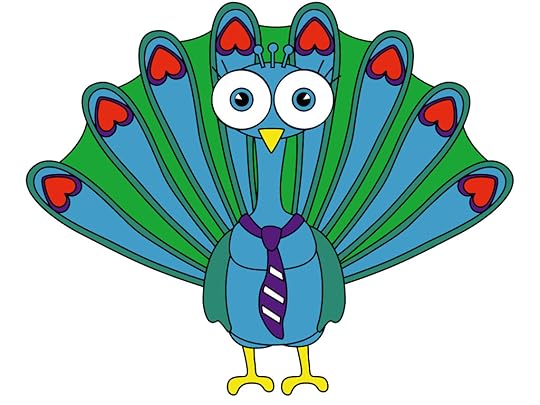
Francis, the WANA Mascot
WANACon is coming up, and we launch tomorrow evening at 6:00 PM EST (New York Time for our foreign friends) and go to 8:30 PM with PajamaCon. Since WANA is founded on a spirit of generosity, we’re offering PAJAMACon to everyone for FREE. Just go to the WANACon Page and on the right side you will see this:
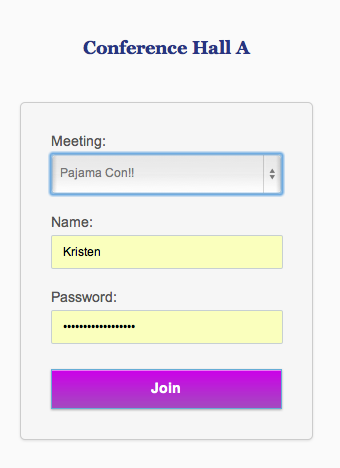
Portal to F-U-N!
You see in the Conference Hall A Selector I chose PajamaCon, then enter your name (or alias) and the password is “WANARocks”. Anything that pops up, just allow. We do this to keep your computer secure.
I know that WANACon is a bit futuristic and maybe some of you are shy about how a virtual conference works, so here’s a great time to check it out. Also, I’ll be there. What more reason do you need?
Ouch! I just got a cramp patting myself on the back!
Today, I want to take a little time to point out what is going to be SO awesome about WANACon (aside from teaching from top-tier publishing pros, AMAZON, free recordings, sweet price point, NO travel, no layovers, no TSA, no hotel and no overpriced restaurant food).
Agents
Okay, a moment about agents. I made an executive decision not to have agents at this WANACon. Why? Because NYC grinds to a halt roughly in November. The odds of ANY pitch (manuscript) landing a sweet publishing contract in three weeks has roughly the same odds as me becoming a bikini model. Reality dictates that most manuscripts will sit untouched until 2014. Why waste your time or an agent’s?
You want any agent selling your work when it’s fresh and they’re still super-stoked-excited…not after your book’s sat on their desk for three months. Just my personal opinion.
So, instead?
I kidnapped recruited the head of the Amazon CreateSpace team to present and show you how to make the most of all the cool tools Amazon provides to help you succeed. For those considering any kind of indie, self-publishing or hybrid publishing? Amazon’s Thom Kephart will be there to show you the ropes.
I also have the owner of Green E-Books to demonstrate all the coolest innovations in e-book technology, and he makes this stuff so simple even I understand it (and have yet to figure out my e-mail *sigh*).
Craft
We have the LEGENDS David Corbett and Les Edgerton and these two guys alone are worth the price of the entire conference. I’ve been to countless conferences and workshops and read all the craft books. There are very few teachers who are game-changers.
Even though I’ve been writing professionally for ten years, I still attend craft classes. It is rare that I blow through half a notebook taking notes. I stalked both Corbett and Edgerton until they agreed to do WANACon…and reconsider the restraining orders  .
.
Technically this is a “virtual” conference, so I’m not in violation of the 1000 feet “rule” the “courts” have established.
My Classes
I am teaching three sessions at WANACon, all classes I’m not regularly offering.
The first is Many Roads to Rome—Choosing a Publishing Path. How do you know whether to self-publish or keep trying to score a traditional deal? Not all writers (or works) are suited to be traditionally published. Other personalities will DIE trying to self-publish. Sometimes a book is great, but the publishing path chosen is ill-suited for the work. You might want to even consider a hybrid path.
This class will offer guidance on one of the most important decisions we will ever make. How DO we publish?
Then I have Killing Little Darlings with Ruthless Efficiency. Ever heard of RAMBO? I am LAMBO. I have slayed entire villages of Little Darlings. I’m going to teach you ways to spot them, cut them, kill them and maybe even not create them in the first place.
Prevention IS the best cure.
Then, lastly, NaNoWriMo Bootcamp.
NaNoWriMo (National Novel Writing Month) is the month of November. 50,000 words in one month. Sounds like a lot. If we write every day, roughy 1,600 words a day. If we take weekends off? 2,000 words a day. Granted, NaNoWriMo isn’t about writing a perfect book. It is, however, a GREAT introduction into what it’s like to keep and maintain a professional pace.
Many writers start out hot and heavy, write themselves into a corner, then burn out and DIE. Most of the time, this is preventable if we have some basic know-how and start off correctly. There is no sense in killing ourselves for a month to reach 50,000 words only to end up with an unfixable nightmare that chews on the furniture and pees on the rugs.
I would assume that anyone who vows to complete NaNoWriMo would like to create something that can be revised, polished and published. Throwing away a month of time and tens of thousands of words is hard on the body and the ego. Why not write something solid that can be shaped into something FANTASTIC?
Other Stuff
We have Susan Spann who is an Intellectual Property and Publishing Attorney to teach you about contracts. When do you sign? When do you walk away? When do you RUN away?
Some of you might want to add romance to your book or even a–GASP!—love scene. How do we write those without sounding like bad porn?
Hey, I’m here to fix your cable?
But I don’t HAVE cable….
Best-Selling Author Candace Havens has written more books than I could fit on our digital book table. She’s written at all levels of “heat” so whether you want the sweet romance or are writing erotica, Candy has the know-how to help you write scenes readers will love…instead of rolling their eyes.
For the NF Folks
We have long-time journalist Caitlin Kelly. She’s written multiple books and has worked as a freelance writer for most of her career. She’s had over a 100+ freelance articles in The New York Times and recently was published in Cosmopolitan Magazine. This lady KNOWS her stuff. She’s tough and will tell it straight, but this business isn’t for the faint of heart.
We also have media personality Amy Shojai to guide you how to write a NF proposal. Not only is she an amazing and energetic teacher, Amy has been featured on ABC, NBC, CBS, CNN, and in USA Weekend, The New York Times, Washington Post, Reader’s Digest, Woman’s Day, Family Circle, Woman’s World, and many other leading newspapers and magazines.
She regularly appears on national radio and television in connection with her pet writing. Most recently, she appeared as a dog and cat expert on Animal Planet’s DOGS 101 and CATS 101.
Then There Will Be (Of Course) Social Media
Gaping at G+? Fried on Facebook? We have you covered  .
.
Web Nightmares
I can attest that getting an author web site is about as confusing and pleasant as a colonoscopy (and the after-effects can feel strangely similar).
It’s easy to get ripped off. I have been ripped off multiple times. Why? I didn’t know what questions to ASK. When we step out to do this new thing of finally being serious enough to get a website, we are NEW.
We are too dumb to know what we don’t know. Sometimes, we think if we throw more money at it, MORE MONEY=AWESOME. Or, if we are broke, we assume we can’t have a good-looking web-site.
WRONG.
Laird Sapir is a trusted WANA web designer. She’s smart, savvy and affordable but not at WANACon to sell you anything (unless you want). I recruited her to educate you. If you don’t have a web site, how do you find a designer? The right designer? What do you need to know? What questions do you ask? What should you reasonably PAY? How do you negotiate?
If you already have a web site, what are some things you can do to make your site more appealing to visitors? What are some changes you could possibly make that might sell more books?
And SO MUCH MORE!!!
This is just a sample of the awesome that will be at WANACon (you can check out the full schedule HERE). And remember, if you can’t attend or miss a session or two, you get the recording, notes and handouts FREE as part of your conference.
WANACon is just like a REAL writing conference. The only things you’re missing out on are the super high price tags, uncomfortable flights, bad conference food, a chance at getting bed bugs from your hotel, and that awkward TSA pat down. Though the guy who sold me my Interview Van works for tips and a pat down can be arranged.
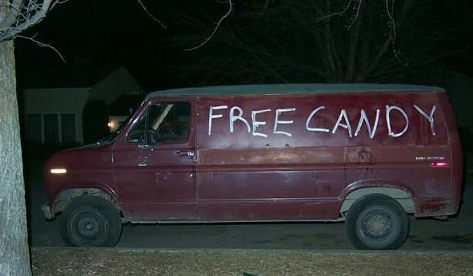
Just ignore the ankle monitor.
So you can go ahead and sign up HERE. We are also selling individual days if that fits your schedule or budget better. BUT, there isn’t ANY excuse to not stop by and check out the fun at PajamaCon. Here are our best-practices and trouble-shooting guidelines to make PajamaCon (and WANACon) as pleasant as possible. For instance, Safari will cough up a hairball with our technology. Google Chrome and Firefox play better. Simple stuff like that.
I’ll be at PajamaCon so we can meet. You can ask questions about craft, social media, branding, or even why tin foil is completely useless for keeping the aliens from reading your thoughts. It’ll be FUN  .
.
For those of you who might not have met the WANA Mascot, Francis, here’s his debut film. I think a lot of us can relate. WANACon is a way to start reaching your dreams without adding time strain and financial pressure.
I hope to see you at WANACon, but at LEAST PajamaCon.
Lock the kids out of the bedroom for a couple hours and take time for YOU. Let your inner artist have a play date with the pros.


October 1, 2013
Asking “What If?” & Exploring the Unknown–A Final Word on Writing Horror
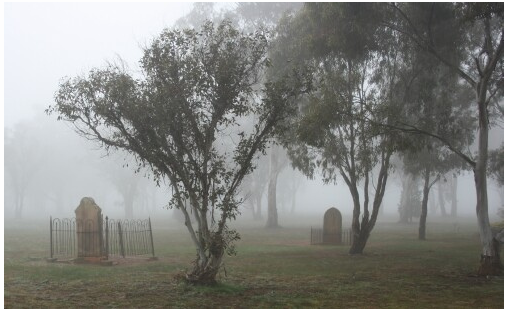
Debbie Johannson WANA Commons
Fear is the most important tool in any writer’s toolbox. Fear is the beating heart of conflict, no matter the genre. Fear of death. Fear of losing love, not finding love, not recognizing love. Fear of change. Fear of remaining the same. In Cormac McCarthy’s Pulitzer Prize-Winning Novella The Road, the story was less about a fear of death and more about the fear of survival at the expense of one’s humanity. In The Joy Luck Club, Amy Tan explores the fear of continuing generational curses.
In Winter’s Bone, Woodrell examines fear of family, what it takes to possibly betray family and risk death by turning on kin. In Virginia Woolf’s classic Mrs. Dalloway, Woolf probes the fear of being meaningless. Alduous Huxley’s Brave New World explores the fear of government, the tendency of the masses to devolve to mediocrity, and the dangers of society that only exists to seek empty pleasures and instant gratification.
Suffice this to say that I believe all great works (even outside of Horror) tap into our deepest primal fears, probe them, open them, expose them and maybe even (if we are fortunate) give us a glimpse of a cure.
Kevin continues today with a final word about horror.
****
We’ve discussed many things in the past few days about why the horror genre is important, why writing it is important and hard, but I’d like to offer this final thought: if we expand our definitions of horror past chainsaw wielding maniacs and human centipedes, we find that horror, at the root of it all, is often about a quest into the unknown.
As I’ll detail in one of my workshops at WanaCon, almost all the horror plots involve some level of discovery, penetrating the unknown. So horror exists not only because of mankind’s universal fears and a desire and NEED to deal with those fears, horror exists because there exist those special folks – horror writers – who are consumed with the desire to KNOW things, to ask questions that others would never think of asking, or, as the case may be, never dare ask.
I’d like to leave you with this final thought from Stephen King’s Danse Macabre, about why some of us blessed (cursed?) folks are drawn to writing horror:
“As you get ready to leave, think about this…or brood upon it:
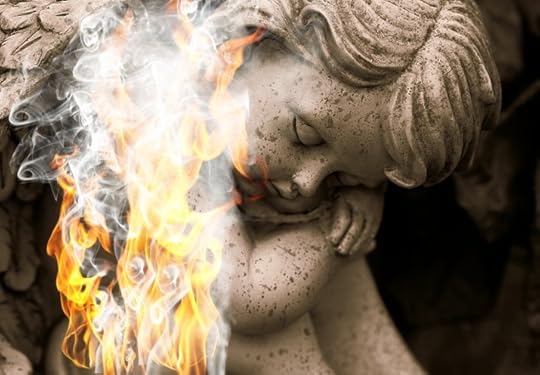
Unknown.
The Story of “Little Miss Nobody”
On July 6th, 1944, the Ringling Brother and Barnum & Bailey Circus was giving a performance in Hartford, Connecticut, before 7,000 paid customers. A fire broke out; 168 persons died in the blaze and 487 were injured. One of the dead, a small girl thought to be six years old, was unidentified. Since no one came to claim her, and since her face was unmarred, a photograph was taken of her and distributed locally and then throughout the U. S. Days passed, weeks and months passed, but no relative, no playmate, no one in the nation came forward to identify her. She remains unknown to this day.
The job of the fantasy writer, or the horror writer, is to bust the walls of the tunnel vision we develop as adults, bust it wide for a little while, to provide a single powerful spectacle for the third eye (our imagination). The job of the fantasy-horror writer is to make you, (the reader), for a little while, a child again.
And the horror writer himself/herself?
Someone else looks at that item about Little Miss Nobody – still unidentified – and says, “Jeez, you never can tell, can you?” and goes onto something else. But the fantasist begins to play with it as a child would, speculating about children from other dimensions, about doppelgangers, about God knows what else.
It’s a child’s toy, something bright and shiny and strange. Let us pull a lever and see what it does, let us push it across the floor and see if it goes rum-rum-rum or wacka-wacka-wacka. Let us turn it over and see if it will magically right itself again.
In short, let us have our Fortian rains of frogs and people who have mysteriously burned to death while sitting at home in their easy chairs; let us have our vampires and our werewolves. Let us have Little Miss Nobody, who perhaps slipped sideways through a crack in reality, only to be trampled to death in a rush from a burning circus tent.
“It’s the best set of electric trains a boy ever had,” Orson Welles once said of making movies; the same can be said of making books and stories. Here is a chance to bust that tunnel vision wide open; bricks flying everywhere so that, for a moment at least, a dreamscape of wonders and horrors stands forth as clearly and with all the magical reality of the first Ferris wheel you ever saw as a kid, turning and turning against the sky.
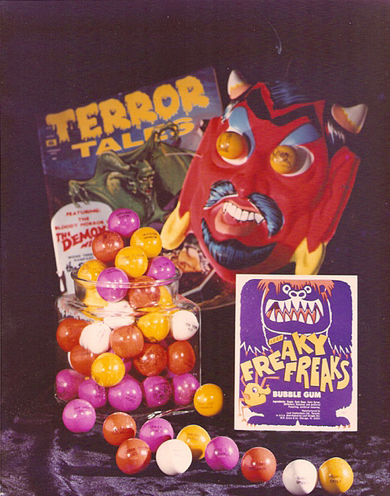
Image via Flikr Creative Commons, courtesy of Greg Koenig
“Someone’s dead son is on the late movie. Somewhere a foul man – bogeyman! – is slouching through the snowy night with shining yellow eyes. Boys are thundering through autumn leaves on their way past the library at four in the morning, and somewhere else, in some other world, even as I write this, Frodo and Sam are making their way toward Mordor, where the shadows lie. I am quite sure of it.” ~Stephen King, Danse Macabe
This is the best way to end my series, I think. I’ve tried to say some very noble things about the importance of the horror genre, and how it’s just as valid as any other genre, and why writing good horror is just as difficult as writing the next Great American Novel.
But all those comments come from my critical, analytical side (where I live every day as an English teacher), and all my own noble and worthy writing goals have become very rooted in my subconscious. What really pushed me toward the horror genre to begin with was the eternal, burning question: Why? and its inevitable follow up: What if…?
And for me?
The horror genre, the genre of the fantastic and strangely beautiful wonders and horrors, simply offered me the most room to play in. I could write a story about a father mourning the loss of his son, and, gripped by guilt, how he goes and sits next to a pond to watch the ducks, and maybe somebody rides by on a bicycle, and then through some heavy exposition – or through the symbolism of a burning sunset – our grieving father works through some resolution, gaining closure as he finally forgives himself.
But that’s just not me.
Cause I really like the idea of his dead son being on the late night movie, reaching through a very special and strange television screen….
Somewhere deep in my own little Twilight Zone.
******
THANK YOU, KEVIN! *does cabbage patch dance* Cabbage Patch Dolls. Talk about creepy (and yes I had them anyway).
What are your thoughts? Do you find yourself holding back in your own writing? Afraid to go to the dark places? What other works (horror or not) do you think did a really fabulous job of exploring our fears? Why did they rattle you? What made you uncomfortable? Did you find relief at the end?
I LOVE hearing from you, and I know Kevin will, too. Ask him your questions. Tell him your fears. Comments for guests get double weight in the contest. Btw, I will announce September’s winner next week. Too slammed with WANACon right now to do it properly. Ah, the contest…
Which is…
To prove it and show my love, for the month of September, everyone who leaves a comment I will put your name in a hat. If you comment and link back to my blog on your blog, you get your name in the hat twice. What do you win? The unvarnished truth from yours truly. I will pick a winner once a month and it will be a critique of the first 20 pages of your novel, or your query letter, or your synopsis (5 pages or less).
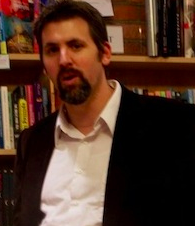
Horror Author Kevin Lucia
Kevin Lucia has worked as an Editor for Shroud Magazine and a Submissions Reader for Cemetery Dance Magazine, and is now an Associate Fiction Editor for The Horror Channel. His podcast “Horror 101” is featured monthly on Tales to Terrify and his short fiction has appeared in several venues. He’s currently finishing his Creative Writing Masters Degree at Binghamton University, he teaches high school English at Seton Catholic Central High School and lives in Castle Creek, New York with his wife and children. He is the author of Hiram Grange & The Chosen One, Book Four of The Hiram Grange Chronicles and his first short story collection, Things Slip Through is forthcoming November 2013 from Crystal Lake Publishing.
ANNOUNCEMENTS:
WANACon is THIS WEEKEND!!! Day One and Day Two are for sale separately so you can choose if you only can fit part of the conference. Just a note: A LOT of major authors sacrificed time for no or little pay to pay it forward and offer an affordable and easily accessible conference for those who need one and WANA is extremely grateful to have them.
WANACon, the writing conference of the future is COMING! We start with PajamaCon the evening of October 3rd and then October 4th and 5th we have some of the biggest names in publishing coming RIGHT TO YOU–including the LEGEND Les Edgerton.
AGAIN, THIS WEEKEND!!!! Get PajamaCon and BOTH DAYS OF THE CONFERENCE for $149 and all recordings for anything you miss or need to hear again. Sign up today, because seats are limited. REGISTER HERE.


September 30, 2013
Why Writing Horror Is–SHOULD BE–Hard Part 2
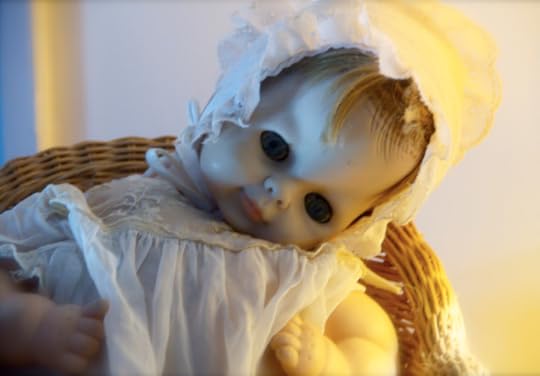
Image via Flikr Creative Commons, courtesy of Niki Sublime
First, a quick announcement. For those who’ve been waiting, my new social media book Rise of the Machines–Human Authors in a Digital World is now available in PRINT. Yay! *happy dance* Almost 300 pages and 1.1 pounds of AWESOME. All you need to build a solid author platform and have time to do the most important part of the job—WRITE MORE BOOKS.
All right. Since it’s coming up on October, it seemed fitting to delve into the genre of Horror, and not simply for those who write spooky tales, but for the rest of us as well.
Elisabeth Kubler Ros once stated:
There are only two emotions: love and fear. All positive emotions come from love, all negative emotions from fear. From love flows happiness, contentment, peace, and joy. From fear comes anger, hate, anxiety and guilt. It’s true that there are only two primary emotions, love and fear. But it’s more accurate to say that there is only love or fear, for we cannot feel these two emotions together, at exactly the same time. They’re opposites. If we’re in fear, we are not in a place of love. When we’re in a place of love, we cannot be in a place of fear.
This means, the more we understand fear, the deeper our writing becomes, the more meaningful, visceral, and profound. In love stories, fear might be of being alone, of never finding “the one” or even losing “the one.” Conflict is always generated by fear. The protagonist wants something BUT THEN… The more intense the fear, the faster the reader turns the pages.
Thus, who better to teach about fear, its necessity, primal roots and tools for generating fear than the horror author? Kevin Lucia (who will be teaching MORE about this at WANACon this weekend) continues….
****
Here’s the thing: if you’re an ardent horror fan and budding horror writer, you’re part of a tradition. And as good fans, you’re aware of this tradition. You’ve been fed on it, raised in it, and the most natural thing for you to do initially is pay homage to that tradition in your work.
I’m not going to try and define horror here (because that could take forever, and I’d still never get close to a definition), but anyone who wants an insightful examination of the horror genre should check out Noel Carroll’s The Philosophy of Horror, or, Paradoxes of the Heart.
It’s a work that really maps out some excellent ideas about what the horror genre is and why people pursue it and this bit here made me feel a lot better about my early “trope” stories:
The creators and consumers of horror fictions are aware that they are operating within a shared tradition (emphasis mine), and this is acknowledged openly, with great frequency and gusto…the horror fiction of the present, though not lacking in energy, also refers back to earlier times, to classic monsters and myths, as if in a gesture of nostalgia.
Noel Carroll, pg. 211

Helllooooo, there, Kiddies…
So those zombie and vampire and werewolf and big bug monster stories you’ve been writing? (And the creepy evil clown ones, too?) They’re nothing to be ashamed of, really. If you’re a horror fan, you’ve been raised on a certain diet, and our earliest efforts are unconscious or maybe even conscious attempts to pay homage to the horror traditions we’ve come to adore.
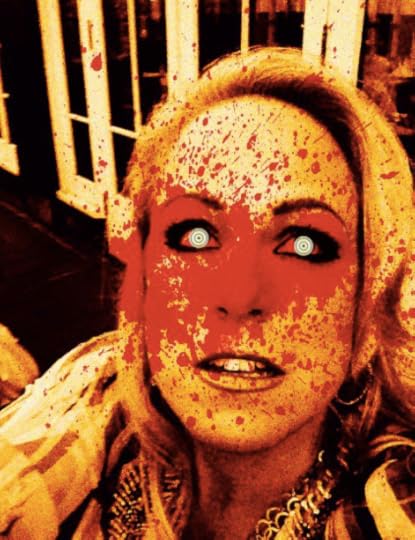
ZOMBIES!
But there’s a difference between horror trope stories and horror stories. I’ve come to this belief through my reading as both a fan and as an editor at several different publications (Shroud Magazine, The Midnight Diner, Cemetery Dance Magazine). And, just like all of you, I’m still trying to write authentic, personal horror stories.
And that’s the first step in writing stories invoking the emotion of horror: searching deep inside yourself and writing stories that come from your GUT, not from your knowledge of the horror tradition. Like when Bradbury made a threshold discovery – ten years INTO his career, mind you – in mining his personal childhood experience while writing “The Lake.”
I can best sum this up in the words of Bram Stoker Award Winning writer and author Mort Castle:
“The best stuff, the stuff that lasts, comes from the late-night conversations we have with our very own selves.”
This hit me hard the first time he said it to me (in an email discussing my work) because it made me realize I was writing horror “trope” stories lacking any personal value. These stories weren’t born out of my own fears and anxieties, but born out of my (admittedly) healthy knowledge of horror’s traditions.
Again – I worked hard on those stories. I believe their craft is sound, to this day. But those stories were motivated and inspired by exterior motives – a vampire story, a ghost story, a haunted house story, etc. – not inspired by my heart or soul. So even though they were fine stories that some people liked, they weren’t living up to their fullest potential.
Also, horror trope stories often lack that sense of violation, transgression or inversion that really evokes the emotion of horror. A story evoking the emotion of horror must begin in some sort of “normal world” – or whatever passes for normal in your story – and there must be some sort of transgression in which the normal world of the protagonist is violated.
What they believe is normal and safe must be inverted and turned against them. Again – as a writer you can never account for all readers. How can you possibly know if the transgression or inversion in your story is really going to impact a reader? That’s nearly impossible to tell.
But when a story begins with an immortal vampire mulling over a warm goblet of blood his plans to overtake the city in a tide of bloodshed with his vampire minions…the emotion of horror is not invoked. This is a horror trope story. It can still be written just as well as any other story on a craft level and be just as enjoyable, but it has fallen short of invoking any emotion of “horror.”

Actually that vampire was mulling over Starbucks.
Lastly, very simply…horror at its best comments on the human condition. For horror to live up to its fullest potential, it must SAY something meaningful and of substance about the trials and pitfalls and struggles and fears and nightmares about what it MEANS to be human, living in this flawed, cracked, all-too human and imperfect world.
It’s an overused quote by now, but I’ll reference Stephen King’s comparison (or someone’s comparison, even SNOPES isn’t sure WHO said it first) of Harry Potter’s legacy and that of Twilight:
“Harry Potter is all about confronting fears, finding inner strength and doing what is right in the face of adversity… Twilight is about how important it is to have a boyfriend.”
For the record, I’m a lover of ALL types of horror stories. I enjoy the often pulpy, thrill-laced horror trope stories of Robert E. Howard and Brian Keene right along with the atmospheric, literary stories produced by the late Charles L. Grant, T. M. Wright, Ramsey Campbell and Norman Prentiss. I adore the literary, gothic sensibilities of Peter Straub, and Dean Koontz simple morality plays are a guilty pleasure.
Writers like Norman Partridge have produced both kinds of stories, and younger writers such as Rio Youers and Ron Malfi have taken the horror conventions and twisted them to their own ends. And, in the end, we need to write what’s inside us, what we WANT to write.
But it’s an important question for all horror writers – especially new and budding writers – to consider. What are you writing? Horror trope stories, or stories truly invoking the emotion of horror?
And if your aim is the latter…go deeper inside yourself. Find your fears. Take normal characters and invert their lives, transgress their natural order and say something about what it means to be a human in this mean, bad old world of ours and then maybe, maybe you’ll write some of the “best stuff…the stuff that lasts.”
I know I’m still trying.
****
Thanks, Kevin! Wanna know my idea of a horror story that reflects society?
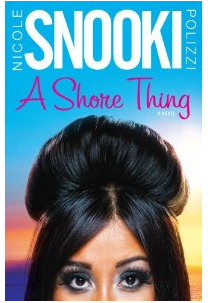
Aaaahhhhhhhhh!
All kidding aside (okay I wasn’t kidding), what are your thoughts? Questions? I DO believe that fear is essential in ALL genres and ALL great stories. As an editor, one of the BIGGEST problems I see is the writer holding back emotionally. They fail to GO FOR THE GUTS.
Why?
Guts are sticky, messy, gross and leave us conflicted. THAT IS GOOD. Fiction is the opposite of reality. In reality we avoid fear, terror, conflict, but as writers—GOOD WRITERS—we should go right for the throat. RAISE THOSE STAKES! Scare the protagonist! Have them fear personal and LITERAL extinction of themselves, everyone they love and all they hold dear. MAKE THE READER WORRY.
It is our DUTY as authors to be sadists and saviors simultaneously.
How you like that for alliteration? 
I LOVE hearing from you, and I know Kevin will, too. Ask him your questions. Tell him your fears. Comments for guests get double weight in the contest.
Which is…
To prove it and show my love, for the month of September, everyone who leaves a comment I will put your name in a hat. If you comment and link back to my blog on your blog, you get your name in the hat twice. What do you win? The unvarnished truth from yours truly. I will pick a winner once a month and it will be a critique of the first 20 pages of your novel, or your query letter, or your synopsis (5 pages or less).

Horror Author Kevin Lucia
Kevin Lucia has worked as an Editor for Shroud Magazine and a Submissions Reader for Cemetery Dance Magazine, and is now an Associate Fiction Editor for The Horror Channel. His podcast “Horror 101” is featured monthly on Tales to Terrify and his short fiction has appeared in several venues. He’s currently finishing his Creative Writing Masters Degree at Binghamton University, he teaches high school English at Seton Catholic Central High School and lives in Castle Creek, New York with his wife and children. He is the author of Hiram Grange & The Chosen One, Book Four of The Hiram Grange Chronicles and his first short story collection, Things Slip Through is forthcoming November 2013 from Crystal Lake Publishing.
ANNOUNCEMENTS:
WANACon is THIS WEEKEND!!! Day One and Day Two are for sale separately so you can choose if you only can fit part of the conference. Just a note: A LOT of major authors sacrificed time for no or little pay to pay it forward and offer an affordable and easily accessible conference for those who need one and WANA is extremely grateful to have them.
WANACon, the writing conference of the future is COMING! We start with PajamaCon the evening of October 3rd and then October 4th and 5th we have some of the biggest names in publishing coming RIGHT TO YOU–including the LEGEND Les Edgerton.
AGAIN, THIS WEEKEND!!!! Get PajamaCon and BOTH DAYS OF THE CONFERENCE for $149 and all recordings for anything you miss or need to hear again. Sign up today, because seats are limited. REGISTER HERE.


September 27, 2013
Why Writing Horror Is–SHOULD BE–Hard Part 1

Image via Flikr Creative Commons, courtesy of normanack.
Whether one likes Horror or doesn’t, as artists, we can ALL learn to be better writers by studying what great Horror authors do well. Powerful fiction mines the darkest, deepest, grittiest areas of the soul. GREAT fiction holds a mirror to man and society and offers messages that go beyond the plot.
[image error]
From the film, “I, Robot.”
Though not, per se, “Horror”, Isaac Asimov’s I, Robot is an excellent example. The Spawn recently fell in love with the movie and I’ve seen it 78 times in the past week (and am oddly okay with that). I, Robot isn’t just a story about a guy battling robots. There are so many messages about society—the costs of relinquishing personal responsibility/accountability, the dangers of blind faith, the real price of being totally “safe”, the ugly price of “convenience,” prejudice, and even the nature of the soul.
This story is SO GOOD because it is deeply, viscerally terrifying. Yet, it isn’t “Horror.”
And it could happen.
Stephen King is one of the most legendary authors of our time, and not just for scaring us. I feel King’s ability to see and relate the dark aspects of human nature and society is what makes him an author in his own league. The Green Mile, The Shawshank Redemption, and even Stand By Me weren’t horror stories, and yet they are some of his finest works.
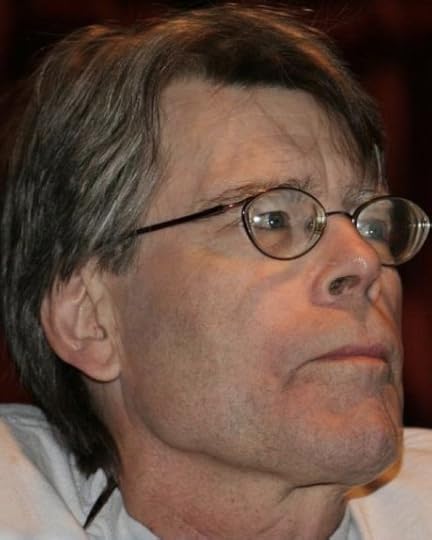
Author Stephen King
THIS is one of the main reasons I pursued a Horror expert to guest post and to teach at WANACon, because no matter which genre we write, the core tenets of good Horror are masterful guides to connecting to and affecting the souls of our readers.
Take it away, Kevin!
****
In my last posts I shared why I think horror is one of the most important genres, because – maybe more than any other genre – it has the potential to comment deeply on the human experience. In the right hands, horror can hold up a very unflattering mirror and show us what we really are: broken, scared creatures flawed and cracked, a species tragically ruled by fear, prejudice, insecurity, pride, anger, selfishness and cruelty.
And in the right hands horror also shows our better selves rising above our flaws.
Horror plays out supernatural battles between good and evil in the flesh; horror serves as a litmus test for a society or a nation’s conscience. What we truly fear reveals so much about our character, our true natures; as well as how we face those fears and either rise to meet them, or succumb to them.
That is why horror is – or SHOULD BE – hard to write. Emotionally, as well as spiritually.
That’s not to say that writing horror shouldn’t be fun or enjoyable. By no means. I’m not one of those folks you’ll see lamenting on Facebook about the awful “burden of being a writer,” that I’m a “slave to the muse” or that I “wish I wasn’t compelled to write.”
No, I get a kick out of making things up; especially making up stories about ghosts and ghoulies and monsters and those who face them. I feel immensely blessed to have the opportunity to contribute whatever little I can to the horror genre.
What does it “mean” to write horror?
But more and more, as both a writer and an editor, I’ve come to ponder what it really means to write horror, and the difference between a story that invokes that emotion we call horror and a story that merely utilizes horror tropes.
A clarification, first: I am not an elitist. I love reading and stories of all kinds too much to be a “story snob.” And stories utilizing horror tropes can be just as well-written as anything else. Excellent craft – prose, dialogue, characterization and character development – should be present in ALL fiction, regardless of genre.
A paranormal romance or zombie thriller can be just as well written as a wrenching ghost story about a father mourning the loss of his only son.
And also, I truly feel we are called to write certain stories. I’ve always thought writers experience a form of socially-acceptable multiple-personality disorder. A multitude of voices clamor in our heads for attention, characters who want their stories told. Some of those stories are horror stories. Some of them are not.
Some of them are quiet, creeping tales of unnamable dread, others are highly-charged, emotional, personal stories and still others…well…go splat a little more than the rest.
Terror
In Danse Macabre, Stephen King makes the distinction between three types of stories – tales of terror, (which he calls the finest emotion), tales of horror and tales of revulsion. Tales of terror never really shows you that thing that’s on the other side of the door.
Our reaction to it and how our fears change us and rule us is far more important than the actual thing itself; our imagination doing all the work. Two excellent examples would be W. W. Jacob’s classic tale “The Monkey’s Paw” and Shirley Jackson’s seminal novel The Haunting. A really wrenching, emotionally-charged modern version of “The Monkey’s Paw” is found in “Forever,” the 17th episode in Buffy the Vampire Slayer, Season 5.
Horror
The second tale Stephen King references are tales of horror. The only difference between the two, according to King, is that horror shows us what’s behind that door, and let’s be brutally honest, here. Sometimes we NEED to see what’s behind that door.
I adore Lovecraft’s work, but after awhile, I really need to see that unnamable horror, need to glimpse what that thing is.
An excellent example of a novel that shows us without sacrificing its power is Hell House, by the late Richard Matheson. We are shown the horror in that book. Boy, are we shown, and to devastating effect. Also, the movie “Se7en” – staring Brad Pitt and Morgan Freeman – has become a classic film that’s been poorly imitated for years, and it succeeds by showing just enough (though it’s ultimate triumph – where its imitators fail – is never showing us what’s IN THE BOX, but that’s okay, because we KNOW. And that’s worse than seeing.)
Revulsion
The final tale is that of revulsion. In this tale, almost everything is secondary to that revolting image, serving as a means to that end and nothing more. Stephen King references the old EC horror comics here; I’m going to reference The Human Centipede.
Almost everything in that film serves only to deliver us the image of three people sewn together, mouth to anus. Prepped by the trailers for this, the audience is waiting for that moment, and when it’s delivered halfway through the movie there’s nothing left to wait for, the rest of the film becoming more of endurance test than an actual story.
However, revulsion still has its place and can be used effectively. In his treatise on the horror genre, The Philosophy of Horror, Noel Carroll asserts that part of horror’s true power lies in its violation of the natural order as we know it.
Revulsion used well (think of that X-files episode with the cannibalistic, inbred redneck family whose sons keep impregnating the bed-ridden mother), confronts us with a violation of what we know to be the natural order of things. An EXCELLENT recent example of this type of revulsion can be found in Kealan Patrick Burke’s acclaimed novel, KIN.
Another good example: William Faulkner’s “A Rose for Emily.” Because sometimes grief pushes us over the age into violating the natural order of things. Let’s admit; it’s hard to let go of a loved one.
Even when they start to smell…
Another clarification: as a writer, I’m just like all of you – struggling toward that elusive goal of refining my craft. I’ve written my fair share horror trope stories, and I’d like to think they’re good, solid stories. AND, I believe that writing horror trope stories is part of a horror writer’s natural development. But more on that next time  ….
….
****
Thanks, Kevin! What are your thoughts on all this? What stories (horror or not) have horrified, terrified or repulsed you? I know the recent Tom Cruise movie, Oblivion kept me up almost all night (and it’s sci-fi).
Why? Because I kept thinking, This could happen. And not necessarily from aliens. Technology-wise (I read Popular Science and Popular Mechanics) we are about 3-5 years from perfecting similar drones.
What if this technology landed in the wrong hands? With universal health care and the current trajectory of law enforcement, we could easily have a record of everyone’s DNA on file by 2020. What if our DNA could be programmed into a drone that could scan us and mark us friend or foe?
“Foes” get to be a red mist, btw *shivers*. As I said, TERRIFYING.
I LOVE hearing from you, and I know Kevin will, too. Ask him your questions. Tell him your fears. Comments for guests get double weight in the contest.
Which is…
To prove it and show my love, for the month of September, everyone who leaves a comment I will put your name in a hat. If you comment and link back to my blog on your blog, you get your name in the hat twice. What do you win? The unvarnished truth from yours truly. I will pick a winner once a month and it will be a critique of the first 20 pages of your novel, or your query letter, or your synopsis (5 pages or less).

Horror Author Kevin Lucia
Kevin Lucia has worked as an Editor for Shroud Magazine and a Submissions Reader for Cemetery Dance Magazine, and is now an Associate Fiction Editor for The Horror Channel. His podcast “Horror 101” is featured monthly on Tales to Terrify and his short fiction has appeared in several venues. He’s currently finishing his Creative Writing Masters Degree at Binghamton University, he teaches high school English at Seton Catholic Central High School and lives in Castle Creek, New York with his wife and children. He is the author of Hiram Grange & The Chosen One, Book Four of The Hiram Grange Chronicles and his first short story collection, Things Slip Through is forthcoming November 2013 from Crystal Lake Publishing.
ANNOUNCEMENTS:
WANACon now has Day One and Day Two for sale separately so you can choose if you only can fit part of the conference. Just a note: A LOT of major authors sacrificed time for no or little pay to pay it forward and offer an affordable and easily accessible conference for those who need one and WANA is extremely grateful to have them.
WANACon, the writing conference of the future is COMING! We start with PajamaCon the evening of October 3rd and then October 4th and 5th we have some of the biggest names in publishing coming RIGHT TO YOU–including the LEGEND Les Edgerton.
Get PajamaCon and BOTH DAYS OF THE CONFERENCE for $149 and all recordings for anything you miss or need to hear again. Sign up today, because seats are limited. REGISTER HERE.


September 26, 2013
Why Is Horror So Important?–Part Two
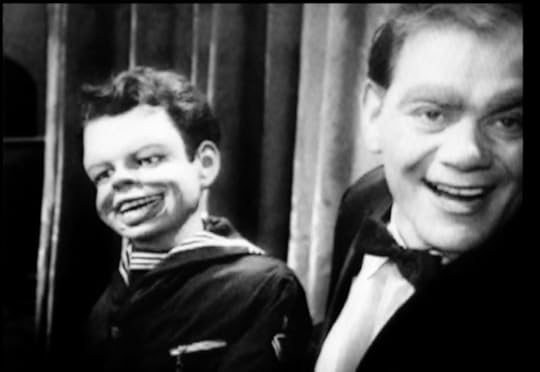
Creepiest Twilight Zone Episode EVER!
Yesterday, we explored the often overlooked genre of Horror with Author Kevin Lucia. Why are we fascinated by being scared? What purpose does the genre of Horror serve? Why is Horror vital to the human condition? Today, Kevin continues as guide into the dark realms of the human condition.
No need for two gold coins for passage. We’re classy that way  .
.
And remember, Kevin will be teaching BOTH DAYS at our virtual writing conference WANACon next weekend along with writing legends like Les Edgerton and David Corbett, so get your seat! All the benefits of a writing conference without the hassles.
Take it away, Kevin!
***
Three years ago, on our annual vacation to the Adirondacks, at Enchanted Forest’s Water Safari, I made an awful mistake that’s haunted me ever since. To make a long story short: my autistic son discovered the kiddie water tubes that summer and fell in love with them. Embolden by this, I took my son – too young to know better – down one of the big slides, Black River Falls. What I wasn’t counting on?
The all encompassing darkness.
The water, which rushed MUCH faster than in the kiddie tubes.
And my son’s screams.
Now, I held my boy in a death grip and we survived, and more than likely we were never in any real danger. But it haunted me (and honestly, it chills me even writing this) wondering what could’ve happened if I’d let him go, my two-year old autistic son who didn’t understand WHAT was going on, much less know how to swim. And of course the shame I felt at my foolish risk nearly overwhelmed me. I felt irresponsible, a horrible father.
Two summers later, Lamplight Magazine solicited me for a novella. I wrote about that incident, imagining a scenario in which my worst fears had come true, and the consquences. And to date, it is one of the hardest things I’ve ever written, and I think one of the best things I’ve ever written, because it hurt so much to write.
Perhaps one of the best reasons why horror is one of the most important genres is how it examines the human condition, by probing our worst nightmares and fears, as well as examining society and humanity – all our best and worst aspects – in close detail.
Good horror takes characters of depth and exposes them to their worst fears, watching closely how they either rise or fall…which speaks (no, SHOUTS) volumes about us as humans.
Though not strictly a horror series, this is why some of the best Twilight Zone episodes reverberate with a haunting resonance that simply won’t let us go. Episodes like Living Doll, The Masks, The Shelter, I Am the Night Color Me Black – these aren’t just freaky, weird tales that leave us feeling chills down our spines for thrill’s sake alone.
No, these episodes in particular showed us the dark, ugly side of human nature…they held up mirrors that showed us all our most unsavory aspects.
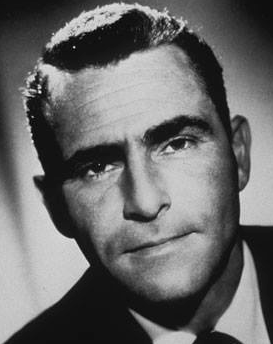
Rod Sterling
The Twilight Zone has its flaws, but this is why the series endures today in endless syndication: Rod Serling found that horror (along with fantasy and science fiction) provided an excellent vehicle for stories about social consciousness, stories he might not have been able to tell on television otherwise; and like Sterling, scores of horror authors believe their genre allows them to ask questions about that which most of us would rather not even consider:
“What I see is pain and isolation that empowers not the sufferers, but that which afflicts them. I
want a reason for this. I want a reason for babies born with cancer, for the endless supply of thoughtless cruelties both little and large we inflict on one another on an everyday basis, for old folks who are abandoned to die alone and unwanted and unloved.
I want an explanation, please, for all of the soul-sick, broken-hearted people who become so hollowed by their aloneness that they turn on the gas, eat the business end of shotgun, or find a ceiling beam that can take their weight. I want sense made of this. I want to know the reason why…and since none is forthcoming, either from above or those around me, I’ve decided to try and find an answer on my own. So far, the best – the only – way for me to work toward this is through writing horror stories.”
- Gary Braunbeck, To Each Their Darkness (Apex Publications)
Horror. One of our most important genres, because it comments on our fears and nightmares, on the things that makes us weak, holds up unflinching mirrors to show our inherent ugliness, and dares ask questions about things the rest of us would rather ignore. And, like any other genre, SO many want to write in it.
But writing GOOD horror is hard. SO hard. And even I’m still struggling, myself. But I think I’ve begun to understand the key elements to writing GOOD horror, and that’s what I’ll share next time….
***
Thanks so much, Kevin! Did you guys grow up watching Vincent Price and those old Edgar Allen Poe black-and-white movies? Did you cut your story teeth on Twilight Zone, too? To this DAY I hate dolls and clowns because of the ventriloquist episode (on top of “It” and “Poltergeist”).
Have you ever had a similar terrifying experience like Kevin? One you later mined for a work of fiction?
As a personal aside, I know my short story Dandelion was written winter of this past year and published in the spring. As a mother, after Sandy Brook, my mind had to give resolution and make some sense of the sheer random horror of the event (for some reason, when I write NF I am very light and funny and my fiction goes DARK and Dandelion I think qualifies as a version of horror, so READER BEWARE if you check it out).
Have you ever had a piece you HAD to write because the sheer terror or emotion of it demanded action? What books, movies, shows influenced you the most as an adult?
I LOVE hearing from you, and I know Kevin will, too. Ask him your questions. Tell him your fears. Comments for guests get double weight in the contest.
Which is…
To prove it and show my love, for the month of September, everyone who leaves a comment I will put your name in a hat. If you comment and link back to my blog on your blog, you get your name in the hat twice. What do you win? The unvarnished truth from yours truly. I will pick a winner once a month and it will be a critique of the first 20 pages of your novel, or your query letter, or your synopsis (5 pages or less).

Horror Author Kevin Lucia
Kevin Lucia has worked as an Editor for Shroud Magazine and a Submissions Reader for Cemetery Dance Magazine, and is now an Associate Fiction Editor for The Horror Channel. His podcast “Horror 101” is featured monthly on Tales to Terrify and his short fiction has appeared in several venues. He’s currently finishing his Creative Writing Masters Degree at Binghamton University, he teaches high school English at Seton Catholic Central High School and lives in Castle Creek, New York with his wife and children. He is the author of Hiram Grange & The Chosen One, Book Four of The Hiram Grange Chronicles and his first short story collection, Things Slip Through is forthcoming November 2013 from Crystal Lake Publishing.
ANNOUNCEMENTS:
WANACon now has Day One and Day Two for sale separately so you can choose if you only can fit part of the conference. Just a note: A LOT of major authors sacrificed time for no or little pay to pay it forward and offer an affordable and easily accessible conference for those who need one and WANA is extremely grateful to have them.
WANACon, the writing conference of the future is COMING! We start with PajamaCon the evening of October 3rd and then October 4th and 5th we have some of the biggest names in publishing coming RIGHT TO YOU–including the LEGEND Les Edgerton.
Get PajamaCon and BOTH DAYS OF THE CONFERENCE for $149 and all recordings for anything you miss or need to hear again. Sign up today, because seats are limited. REGISTER HERE.


September 25, 2013
Why is Horror Important?–Part One

Image via Flikr Creative Commons, courtesy of Sebastian Dooris
Horror is probably one of my favorite genres and always has been. When I was a teen, we didn’t have YA. We had Dean Koontz, Stephen King, H.P. Lovecraft and Clive Barker. My parents were thrilled I was reading. I wonder how they would’ve felt had they known what I was reading. Yet, growing up, I couldn’t get enough scary books or horror movies and not much has changed.
Even now, when life is stressful, out of control, or I’ve had a day that’s simply served me my own tail-end on a platter, what’s my favorite outlet? A good scary movie. Not slasher flicks, but horror; terrifying, well-thought stories. In a way, I find this strange, since I dedicate most of my waking hours to making other laugh, empowering them, teaching them and encouraging them.
So why, of all things, would I be drawn to something that could scare the wits out of me?
That’s a great question, and while I have my own opinions, I’ve decided to defer to an expert. Kevin is one of those rare blessings we can uncover with the Internet and social media. Though Kevin and I initially got off on the wrong foot, something akin to, “Kristen, please stop pirating my cable” which was a REAL trick since I live in Texas and he’s all the way in New York, we’ve become fast friends.
I quickly became fascinated by Kevin’s work, his writing, and the way he could explain a genre that’s intrigued me so much for most of my life. There are great writers and there are great teachers. It’s a great treasure to find someone who is BOTH (which is why Kevin will be teaching both days at WANACon).
That, and Stephen King has not fallen for the “free-candy-panel-van trick.” He’s slick that way.
But, I know you will greatly enjoy Kevin, so I am shutting up now and handing the show over to him…
****
Two summers ago on my family’s annual week-long vacation in the Adirondacks we spent a day in Lake George. After walking the sidewalks, I spied an attraction that of course piqued my curiosity:
Obviously, this lover of all things spooky was intrigued. I tried to get my seven year-old daughter to brave the museum with me but she wouldn’t bite. So my wife told me to go ahead and they’d meet me after at a park nearby. I felt a little silly going alone, but several turns into the tour I felt a lot less silly.
And just a bit…disconcerted.
Uneasy.
Dare I say…afraid?
I’ll say this, those House of Frankenstein folks did a nice job, especially with a bunch of inanimate wax statues. The lights inside were very dim, but they let me see just enough to feel uneasy, even though I knew I was looking at wax statues. I’d round a blind corner, then a display would light up, startling me. I’d descend a flight of brightly lit, normal-looking stairs, expecting it to be over…turn the corner and once more find “things” shrouded in darkness.
When I finished that tour, the sun shined just a little bit brighter, the air felt warmer and I felt REALLY happy to catch up with my family; simply happy to be alive and healthy and not alone. Even for a guy who’d been writing horror for ten years or so, the experience proved to be a threshold moment: the darkness and disorientation and unpredictability (even though simulated) of that wax museum made me appreciate the light and the warmth and my family just a little bit more.
Anne Radcliffe, one of the first Gothic writers (The Mysteries of Udolpho) might’ve summed my experience up with her thoughts on terror, that it “expands the soul and awakens the faculties to a high degree of life.”
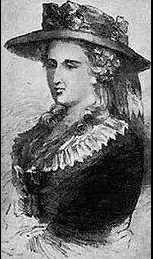
Anne Radcliffe
This is partly why I believe Horror is one of the most important literary genres around. We read these stories or watch these movies and as we close the book or as the credits roll, we think: Thank God. Thank that hasn’t happened to ME. And that, of course, this what early Greek tragedians called catharsis: the process of releasing, and thereby providing relief from, strong or repressed emotions.
I believe the last part of that definition is the most important, differentiating between horror and what I call exploitation. “Strong or repressed emotions.”
According to award-winning horror critic, editor and writer Douglas Winter: “horror is an emotion.” New York Times Best-Selling Author Ted Dekker once said in an aside at a conference, “Horror is one of the hardest genres to practice. To do it right, you have to be willing to make readers cry.”
But isn’t the world horrible enough? With our news sources glutted with stories of domestic and racial violence, school shootings and terrorism? Do we need the horror genre in a world filled with so much horror?
Yes. Yes, absolutely. In fact, we may need it more than ever.
In his masterwork analyzing the horror genre, Danse Macabre, Stephen King writes:
“Why do you (we) want to make up horrible things when there is so much real horror in the
world?
The answer seems to be that we make up horrors to help us cope with the real ones. With the
endless inventiveness of humankind, we grasp the very real elements which are so divisive and
destructive and try to turn them into tools – to dismantle themselves….the dream of horror is
in itself an out-letting and a lancing…and it may well be that the mass media dream of horror
can sometimes become a nationwide’s analyst’s couch.” ~ Danse Macabre, pg. 13
When we trace some of the horror tropes, even ones that seem silly, now (like giant bugs or a lumbering Frankenstein) reflect our nation’s anxieties. Through the thirties – during the Great Depression, when thousands of people felt alienated from society because of something they couldn’t control – horror movies focused on monsters cut off from society not because they CHOSE to be that way, but because they were.
Frankenstein is emblematic of this, when the monster – who was made to be what he was – falls victim to angry villagers brandishing torches and pitchforks, simply for being what his creator made him to be.
Following this thought, is it any wonder the fifties saw scores of movies about irradiated monster spiders and bugs (during the Cold War and nuclear proliferation and testing) as well as armies of emotionless aliens (nice stand-ins for those un-American Commies) INVADING Earth?
And even movies like the original Texas Chainsaw Massacre (not its endless remakes) has its place, coming so soon after the Vietnam War, which shattered the “rules” of combat and exposed authorities as unreliable and untrustworthy.
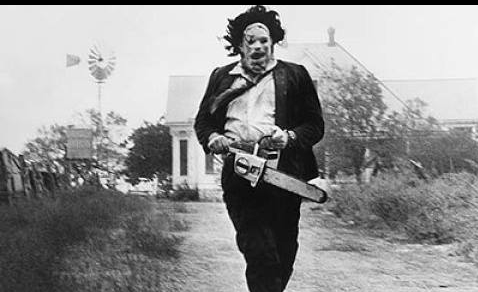
Texas Chainsaw Massacre
In Massacre, people are killed in the light of day, which had always been a trusted element of horror up until then: survive until daylight, and you’re safe. Not so in Massacre, which can very easily represent our twisted emotions and radically altered perceptions as a nation after staggering, battered and bloodied, out of Vietnam.
I read somewhere once about someone saying to Stephen King that he must have lots of nightmares, given what he writes. His answer? No, he doesn’t have nightmares – because he writes. So that catharsis goes both ways: providing not only a necessary release for the reader, but also – and perhaps more importantly – for the writer, too.
***
Thanks so much, Kevin! And we eagerly await the rest of this series. Not only is Kevin going to explore more about the purpose of Horror, but he’ll even offer insight on how to write this tough genre well.
No easy task in our spoiled-CGI-jaded world.
What are your thoughts? Do you gravitate to horror when you’re down like I do? What are some of your favorite horror movies? Why did they resonate? How did they speak to you? What is your favorite type of horror? Supernatural? Religious? Slasher? Reality (I.e. serial killers)? Why do you think you gravitate to that particular type of horror?
Are you like me and STILL remember episodes of the Twilight Zone? And this is why you HATE ventriloquist dolls? Or Jaws and still won’t swim in anything that isn’t chlorinated?
I LOVE hearing from you, and I know Kevin will, too. Ask him your questions. Tell him your fears. Comments for guests get double weight in the contest.
Which is…
To prove it and show my love, for the month of September, everyone who leaves a comment I will put your name in a hat. If you comment and link back to my blog on your blog, you get your name in the hat twice. What do you win? The unvarnished truth from yours truly. I will pick a winner once a month and it will be a critique of the first 20 pages of your novel, or your query letter, or your synopsis (5 pages or less).

Horror Author Kevin Lucia
Kevin Lucia has worked as an Editor for Shroud Magazine and a Submissions Reader for Cemetery Dance Magazine, and is now an Associate Fiction Editor for The Horror Channel. His podcast “Horror 101” is featured monthly on Tales to Terrify and his short fiction has appeared in several venues. He’s currently finishing his Creative Writing Masters Degree at Binghamton University, he teaches high school English at Seton Catholic Central High School and lives in Castle Creek, New York with his wife and children. He is the author of Hiram Grange & The Chosen One, Book Four of The Hiram Grange Chronicles and his first short story collection, Things Slip Through is forthcoming November 2013 from Crystal Lake Publishing.
ANNOUNCEMENTS:
WANACon now has Day One and Day Two for sale separately so you can choose if you only can fit part of the conference. Just a note: A LOT of major authors sacrificed time for no or little pay to pay it forward and offer an affordable and easily accessible conference for those who need one and WANA is extremely grateful to have them.
WANACon, the writing conference of the future is COMING! We start with PajamaCon the evening of October 3rd and then October 4th and 5th we have some of the biggest names in publishing coming RIGHT TO YOU–including the LEGEND Les Edgerton.
Get PajamaCon and BOTH DAYS OF THE CONFERENCE for $149 and all recordings for anything you miss or need to hear again. Sign up today, because seats are limited. REGISTER HERE.


September 24, 2013
Want to Be Successful? Beware of End-of-the-Rainbow Thinking

Image via Flikr Creative Commons, courtesy of Jeremy Schultz
Our culture has been infected with a disease of distortion, what I’m calling “End-of-the-Rainbow-Thinking.” We can all be guilty of this. We see the mega-best-selling-indie, the New York Times best-selling author, the successful small business, the guy with the big house or the family who lives debt-free and we scope-lock on the end result as if this “success” POOF! erupted from the ether.
Reality television superstars, fluke mega-advances for first-time authors, and lottery-winners only reinforce this Get-Successful-Quick-With-No-Effort-On-Our-Part mindset.
The Kardashian Konundrum
A couple days ago, I was checking out at the grocery store and there is an entire issue of a magazine devoted to Kim Kardashian. Why? What has she contributed other than fodder for the gossip mill? Yet, these are the role models that, whether we like it or not, can infect how we view ourselves, our goals and what we seek to accomplish.
We must be mindful to separate junk food “entertainment” from reality.
America in particular has transformed from a culture that once valued hard work and apprenticeship, to one that elevates the ego, the individual, the “self-made”. Yet, serendipity aside, those who’ve experienced authentic success didn’t uncover some pot of gold at the end of a rainbow.
They worked and they worked hard. They worked harder, failed and learned to work smarter.
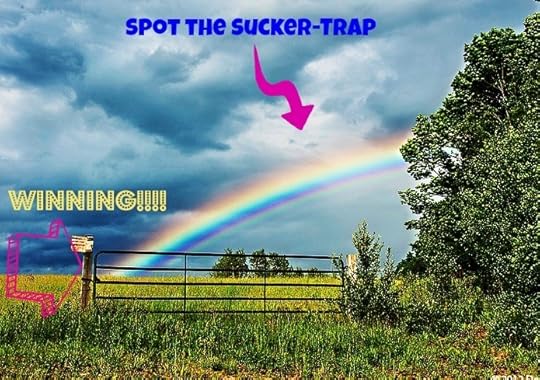
Original image via Flikr Creative Commons, courtesy of dfbphotos
Value the Apprenticeship
Before the Industrial Revolution, skilled labor was very different and had been for centuries. One began studying as an Apprentice under a Master, then, upon reaching a certain benchmark, graduated to Journeyman. After years of skilled practice, a Journeyman might eventually reach the level of Master.
These days, we all have this mistaken notion that we are natural “Masters” on Day One. I can’t speak for any of you, but I know I was this way. I didn’t need craft classes *snort*. I knew how to write a novel. I made all As in English, duh. My biggest concern with my first novel was all the agents who would be fighting over it.
You can laugh at me. I do.
Mastery Myopia
But why I want to bring this up is that, if we believe we should be Masters from the get-go, we risk being less open to feedback, and even potential mentors. Growth is stifled and our gift suffers. We can get discouraged when we haven’t reached a certain benchmark because we are completely unaware that the benchmark was utterly unrealistic to begin with.
For instance, I opened WANA International a year and a half ago. I was a baby CEO. I had people on my team who up and quit because, after six weeks of being “open” we weren’t bazillionaires taking the world by storm. If I hadn’t had my tail end handed to me on a platter by my experiences as a writer, I would have probably bailed, too.
Setbacks are normal. Stalling is normal. Failure is a good thing.
Failure keeps us humble and often opens up better or more efficient ways of doing things. Humility and a realistic perspective liberates us to ask for help, to be open to being teachable. Failures emancipate us from the responsibility of having to “know everything.”
It’s Okay to Be Growing
A year-and-a-half later? I am still growing. I am no longer a Baby CEO. I’m a Toddler CEO well on my way to being fully potty-trained  . But last week, I was being particularly hard on myself and I stopped. WHY? I’m still relatively NEW.
. But last week, I was being particularly hard on myself and I stopped. WHY? I’m still relatively NEW.
This isn’t permission to be lax, foolish, lazy, but it is permission to remember I’m learning. I’m learning by doing and sometimes FAILING. I’m reading stacks of business books penned by those who did this “business thing” better (books that make me want to hurl myself into traffic, btw).
When we aren’t grounded in the reality of what it takes to be successful, we’re vulnerable to barbs from the outside world, because, remember…many of them have fantastical thinking, too.
How many people have you met who have a “great idea” for a super-duper-successful story? They believe the only thing separating them from JK Rowling is writing a book. Many outsiders have a similar belief that command of our native tongue naturally qualifies us to be rockstar best-selling authors.
It’s one of the largest causes for the push-back we experience as authors. If our first time to bat book isn’t a home-run runaway best-seller then we’re “failures.”
Again, End-of-the-Rainbow-Thinking.
The Callouses Behind the Curtain
Most of the world sees only the “finished project” or the “outcome of a dream.” It’s the Ooooooh, ahhhhhhh sparkly stuff they see.
What they DON’T see are all the small steps, calloused hands, and hardened resolve led to that place. They aren’t conscious that any success (financial, personal, professional) is merely the final product, a cumulation of tiny “right decisions” and a series of tough lessons from “wrong decisions.”
They see the beautiful “house” not rebar, concrete, pipes, sheetrock, bricks, nails, blood, and smashed thumbs.
People don’t see when we choose to write instead of going to the mall. They don’t see us up until two in the morning to make a deadline even when we KNOW the toddler will be awake in four hours. They don’t see the rejections, the missteps, the @$$chewings because we made a bad choice. Outsiders don’t see the tens of thousands of words cut away, unusable, the hours and creative blood they represent.

Image via Flikr Creative Commons, courtesy of Kenny Louie
Outsiders don’t see the sacrifice and they won’t appreciate the sacrifice because they weren’t willing to sacrifice, themselves. If they’ve never been through the fire, how can they see it or even value it?
In a world of $100,000 millionaires and instant-credit, the outside world has forgotten. And we can’t control how they think, but we can control how WE think. Every time you choose to write instead of watching TV, count it a victory. Every time you write when you don’t feel like it or research something that is tedious but important, VICTORY!
Every time you stick to the novel you are revising instead of flittering off to a newer “shinier” idea? You’re one step closer to being the professional you’re destined to become. So, lighten up.
Allow room to grow, to fail, to get up and work harder and smarter. You’ll get there. Likely the world will hail you an “instant success” and then you can wink my way because we know better  .
.
What are your thoughts? Have you experienced push-back because you weren’t an instant Stephen King or JK Rowling? Are friends and family some of your toughest adversaries? Are you your worst critic? Do you need to learn to give yourself grace? Hey, I did and still do.
I LOVE hearing from you!
To prove it and show my love, for the month of September, everyone who leaves a comment I will put your name in a hat. If you comment and link back to my blog on your blog, you get your name in the hat twice. What do you win? The unvarnished truth from yours truly. I will pick a winner once a month and it will be a critique of the first 20 pages of your novel, or your query letter, or your synopsis (5 pages or less).
ANNOUNCEMENTS:
WANACon now has Day One and Day Two for sale separately so you can choose if you only can fit part of the conference. Just a note: A LOT of major authors sacrificed time for no or little pay to pay it forward and offer an affordable and easily accessible conference for those who need one and WANA is extremely grateful to have them.
WANACon, the writing conference of the future is COMING! We start with PajamaCon the evening of October 3rd and then October 4th and 5th we have some of the biggest names in publishing coming RIGHT TO YOU–including the LEGEND Les Edgerton.
Get PajamaCon and BOTH DAYS OF THE CONFERENCE for $149 and all recordings for anything you miss or need to hear again. Sign up today, because seats are limited. REGISTER HERE.
For those who are total newbies, I am running a Writer’s Guide to Social Media Class TONIGHT for $39 5-7 EST (NYC time). Use WANA15 for 15% off. We will cover the major platforms, what they do, and which ones might be right for you and your brand.
I am also holding ACHOO!! The Writer’s Guide to Going Viral 5-6:30 EST (NYC time). This class is $49 and, again, use WANA15 for 15% off. Not all content is created equal. This class helps you understand how to understand how search engines work, how to gain favor, and how to create content that will give you traction. Feel like you are blogging to the ether? This class can help.



